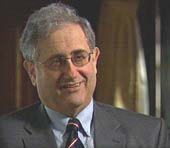Saving the ER for emergencies
New plan eliminates cancellations and cuts costs

Many people worry about the impact of epidemics and terrorist attacks on the nation’s hospitals, but the unfortunate truth is that our emergency care system is already stretched to the breaking point. Once a minute in this country an ambulance is turned away from an overcrowded hospital.
“The emergency care system in this country is close to disastrous,” says Eugene Litvak, a research professor and director of the Management of Variability Program (MVP) at BU’s Health Policy Institute. “Ambulances are constantly diverted from the hospitals; patients wait for hours and hours. It’s absolutely unacceptable.”
Litvak has an answer. His MVP methodology has been tested in several hospitals with deeply encouraging results, both in reducing costs and in providing better care. It works, Litvak says, by addressing the variability of patient intakes: scheduled intakes are deemed an artificial variability, while emergency room intakes are a natural variable. By better managing the artificial variability of scheduled intakes, hospitals can free up resources for emergency care, often with dramatic results. The cause of bottlenecks in emergency care often stems not from fluctuations in emergency arrivals, it turns out, but from irregularly scheduled elective care.
While that idea seems simple, until Litvak came along no one had put such a plan in place. And no one knew where to start.
“Health-care providers are not trained in operational management,” says Brad Prenney, deputy director of MVP, who had previously worked for 20 years with the Massachusetts Department of Public Health, where he oversaw emergency medical services and coordinated the department’s efforts to address ED overcrowding and ambulance diversion. “Our program bridges that gap.”
Litvak, who earned a doctorate in operations research from the Moscow Institute of Physics and Technology, immigrated to the United States in 1988. He had worked in Russia as an industrial efficiency expert at what was then the Soviet Ministry of Transportation, where he helped streamline the building of the nation’s railroads. When he arrived here, he turned his attention to health care.
“It is important to stress that the clinical care provided by doctors and nurses in this country is amazingly good,” he says. “However, service in the emergency departments is next to disastrous. It is a pity to have such impressive clinical care and such a terrible level of emergency service. People ask, ‘What would happen in a major epidemic or terrorist attack?’ My answer is that we are already in deep trouble without either of those.”
MVP has worked successfully with half a dozen hospitals around the country, starting with Boston Medical Center. Delays and cancellations of elective surgeries were nearly eliminated there after surgeons agreed to stop block scheduling and dedicate one operating room for urgent or emergency cases. BMC saw just 3 elective surgery cancellations in the period from April to September 2004, compared with 334 cancellations in that period a year earlier. Using Litvak’s methods, variability in the surgical stepdown unit was reduced by 55 percent, and nursing costs in the unit fell by an annualized amount of $130,000.
Since Litvak started the MVP program at BU in 2000, his methodology has proven itself at several hospitals around the country, and front page stories have appeared in the Boston Globe and the Wall Street Journal. He recently was invited to join the Institute of Medicine committee The Future of Emergency Care in the United States Health System, where he served on the main committee and worked on one of the three reports commissioned by IOM — “Hospital-Based Emergency Care: At the Breaking Point.” Prenney was commissioned to write a paper titled “Patient Flow in Hospital-Based Emergency Services.”
“When the IOM committee speaks,” says Prenney, “the Congress and the nation listen. The IOM is a major voice in the direction of health care in this country.”
Litvak says he hopes that the report will make a huge change in the health-care system. “It spells out the problem,” he says, “and it offers feasible ways of solving it.”
While Congress is calling together committees to address the MVP-inspired reports, Litvak already has his eyes set on his next goal. He wants to address the lack of operations management training for health-care providers.
“This is a national problem,” he says. “What our program does is close this gap, but we have to get more young people involved who have training in both areas. We have to find the right format to teach them. We are working on classes, seminars, and documents. Once we’ve developed the right structure and format, then we’ll bring it to the attention of the administration. Because of BMC and because we are working with many hospitals, BU would provide a unique environment to provide this training.”